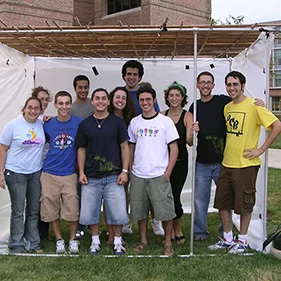It All STEMs from Here

STEM — science, technology, engineering and math — is one of the fastest growing fields in the United States. Between 2017 and 2027, the number of STEM jobs is predicted to grow by 13%, with positions in computing, engineering, and advanced manufacturing in the highest demand, according to a study by Economic Modeling Specialists International.
All across the country, campus Hillels have taken note of the rising importance of STEM fields and have responded by creating spaces for Jewish coders, mathematicians, and scientists to unite.
Back in 2006, Rabbi Aaron Potek was an aspiring engineer, unaware of the career potential for those in his field of study. He just wanted camaraderie with his fellow University of Michigan Hillel engineers.
Rabbi Potek, along with Frayda Kresch, both of whom graduated from University of Michigan in 2008, joined forces to create JEngA, the Jewish Engineering Association. The group watched the ultimate Jewish engineering movie, “Pi,” held a joint bowling night with the Muslim Engineering Student Association and even built a sukkah with clear walls.
For Rabbi Potek, who graduated with a degree in industrial and operations engineering, the club helped foster his fervor for creative engineering projects.
“Michael Brooks, Michigan Hillel’s executive director at the time, was super supportive and hands-off, and he just let me do my thing,” Rabbi Potek said. “We always had space and funding for whatever we wanted to do, whether it was for pizza, sukkah supplies, or T-shirts.”
Both original founders were excited to learn that the group they created over a decade ago is still helping Jewish engineers follow their passions today.
“It’s so cool to hear that JEngA still exists,” said Kresch, who studied emergency medicine at Ben Gurion University of The Negev after completing her undergraduate engineering degree.
Today, JEngA looks pretty similar to its roots in 2006. The members still hold game nights with bowling and ice-breaker Jenga, offer discussions about the intersections of religion and science, and promote friendship among Jewish engineers.
For Joshua Tenzer, the current co-president of the club, joining JEngA helped him experience Hillel as both a religious center and a communal hangout spot, introducing him to those with similar interests.
“I was still in that ‘making new friends’ phase of college when I went to my first JEngA meeting,” Tenzer said. “The club helped a lot with meeting new people, and also with feeling more comfortable in Hillel for non-service reasons.”
At Brown University-Rhode Island School of Design Hillel, members of HEAL, the Hillel Environmental Action League, advise Hillel staff on how to reduce their building’s environmental impact, making changes like replacing disposable plastic Kiddush cups with compostable ones.
For Isaac Sonnenfeldt, a senior studying environmental science and serving as one of HEAL’s student leaders, involving Jewish students in STEM fields rebuffs the notion that science and religion cannot coexist.
“There’s a perception that scientific inquiry and religious practice are incompatible, but through the lens of environmental science, we can work together to fulfill our responsibility of l’avdah ul’shamra, to work and to guard the Earth,” Sonnenfeldt said.
Members of the Jewish Pre-Health Society at University of California, Los Angeles Hillel equate STEM professions with an additional Jewish value: pikuach nefesh, saving a life. One of this group’s most impactful events is its annual week-long partnership with Sharsheret, an organization that supports Jewish women and their families in the fight against breast cancer. Breast cancer disproportionately affects Jewish women because of the prevalence of the BRCA mutation in the Jewish community.
“My favorite event was Sharsheret cake wars, where we decorated a sheet cake with designs related to fighting breast cancer,” said Or Fisher, a senior studying physiological science. “It was really fun and interactive and it was great seeing some non-pre-health students come out and learn about something so important.”
Other Hillels have also created clubs for students studying medicine, including Johns Hopkins Hillel’s Jewish Nursing Student Association and Rutgers Hillel’s Jewish Medical Society.
The staff of Northwestern University Hillel took advantage of their students’ STEM talents when designing the interior of their renovated building. Springboard Innovation Fellow Ilana Bleich organized a committee of 10 students, most of whom were studying STEM fields, in the winter of 2020 to create floor plans and furniture proposals for the space.
One priority for the students was to instill an open feeling throughout the building by organizing rooms to flow into each other and adding a skylight that feeds into both floors.
“It was essential that we knew what students wanted from the building because they’re the main users and audience,” Bleich explained. “We wanted it to fit their needs, hopes, and desires.”
Students used their expertise to optimize natural light in the building, enhance seating setups, and develop ADA (Americans with Disabilities Act) accommodations, all while leaving a lasting legacy in the space. Much of the furniture in the building is now mobile, allowing students to rearrange the setup as needed, an advantage that traditional heavy couches and large armchairs do not afford.
“I really appreciated being included in the redesign process,” said Sophie Boorstein, a senior studying statistics and social policy. “I definitely feel a stronger connection to the building now.”
Just as Michigan Hillel supported Rabbi Aaron Potek’s engineering aspirations 14 years ago, Hillels today have stepped up to create Jewish experiences around the STEM subjects that appeal to their students. No matter which fields pique their interests, Hillels will continue to be there to meet their student’s ambitions.
Dionna Dash is part of the inaugural Hillel International Writers Program, a five-month opportunity for Jewish undergraduate students interested in journalism.